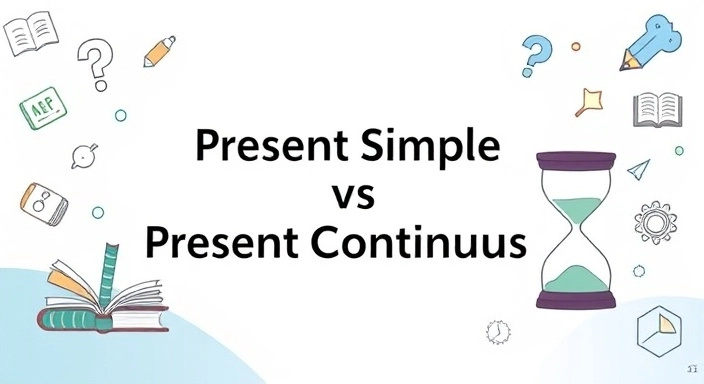Present simple vs present continuous
- Home ›
- Grammar ›
- A2 Pre-intermediate ›
- Present simple vs present...




Choose the correct forms of present simple or present continuous for the gaps below.
Choose the correct present simple or present continuous forms for the gaps below.
Choose the correct present simple or present continuous forms for the gaps below.

- 16 December, 2024
- 535
- Grammar
- A2 Pre-intermediate
Present simple vs present continuous
Introduction
The Present Simple and Present Continuous tenses are essential for describing different kinds of actions in English. While the Present Simple is used for habitual or regular actions, the Present Continuous describes actions happening right now or temporarily.
Present Simple
Form
- Positive: Subject + base verb (add -s for he/she/it).
- Negative: Subject + do not (don’t) / does not (doesn’t) + base verb.
- Question: Do/Does + Subject + base verb?
Examples
- She works every day.
- She work every day.
- Do they play football?
- Does they play football?
Usage
We use the Present Simple for:
- Habits and routines: I drink coffee every morning.
- Facts and general truths: Water boils at 100°C.
- Timetables or schedules: The train leaves at 8 PM.
Present Continuous
Form
- Positive: Subject + am/is/are + verb + -ing.
- Negative: Subject + am not/is not/are not + verb + -ing.
- Question: Am/Is/Are + Subject + verb + -ing?
Examples
- I am reading a book now.
- I reading a book now.
- Are they playing football?
- They are play football?
Usage
We use the Present Continuous for:
- Actions happening now: He is cooking dinner.
- Temporary situations: She is staying with her friend for a week.
- Future arrangements: I am meeting them tomorrow.
Present Simple vs Present Continuous
Key Differences
| Present Simple | Present Continuous |
|---|---|
| Regular or habitual actions. | Actions happening now or temporarily. |
| General truths and facts. | Future arrangements. |
| I work on weekdays. | I am working on a project this week. |
Common Mistakes
- She is knowing the answer. (She knows the answer.)
- He play football every weekend. (He plays football every weekend.)
Practice
Try to create your own sentences using both tenses. Pay attention to when to use each tense and avoid the common mistakes shown above!
Unfortunately, we currently do not have teaching materials available on this topic. We are working with all our efforts to prepare it. You can subscribe to Verbooze to be notified once the teaching materials are ready.




English Learning Made Easy & Accessible for Everyone
Boost your English skills with interactive lessons, grammar explanations, reading and listening exercises, and real-time feedback. Join our growing community and start improving today — all completely free!

